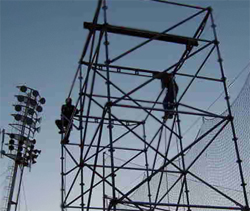Stage rigging involves machinery. The various components of the system move and, because of that movement, the parts of the system will eventually wear out.
That is the primary reason for having your stage rigging inspected. If that’s not motivation enough, there are several other reasons for an annual safety inspection.
The people using the equipment may not know how to operate it properly, and therefore may cause damage to some of the parts.
The equipment may not have been installed properly or – and this happens more often that you’d think – the wrong equipment may have been installed in the first place.
You can imagine the damage that a several ton line array will do when it falls, or when the entire back wall of a set breaks away from the pipe batten and crashes to the floor. People call these incidents “accidents” but that’s a misnomer.
These incidents are caused by neglect. When a rope or cable or other piece of hardware breaks, it doesn’t usually do so without warning. The component may twist or stretch long before it fails.
A good rigging inspector will discover this problem and advise you as to how to prevent these potential “accidents”.
By way of example, let’s look at one element in a counterweight system; the operating line for a counterweight system. This line is used to raise and lower the pipe batten (and consequently, whatever is attached to that pipe) over the stage.
The rope is made of manila or, in a newer theatre, a synthetic rope (usually Dacron). The current industry standard mandates that manila rope should be replaced about every 7 years. The synthetic ropes last 2 to 3 times longer. But this is just a guideline and many things can affect the lifespan of the rope.
An inspector will check the ropes for wear, abrasion points, abrupt changes in the size or shape of the rope and in the case of Manila, dry rot. They will be able to tell you if the rope needs replacing now or at some point in the near future.
Remember, if that rope breaks something will fall, either the pipe batten or the counterweight arbor. Either way, someone could get seriously hurt.















